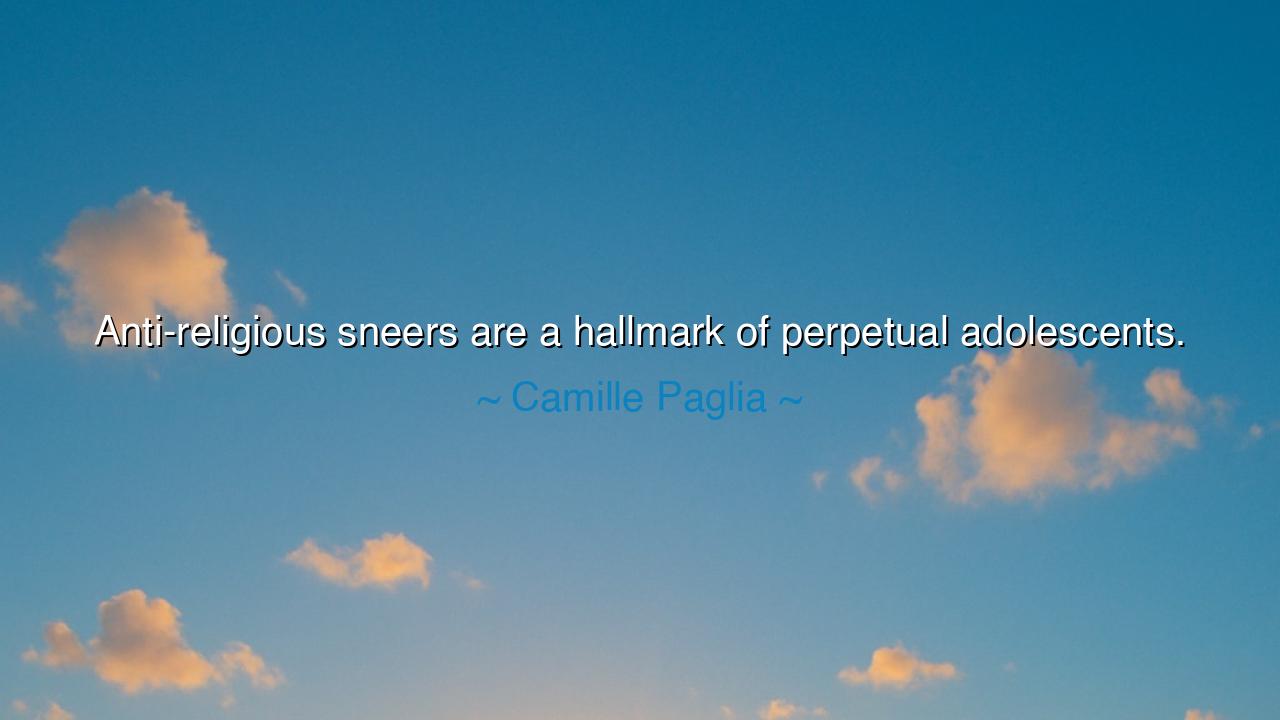
Anti-religious sneers are a hallmark of perpetual adolescents.






“Anti-religious sneers are a hallmark of perpetual adolescents,” wrote Camille Paglia, the fiery scholar whose words cut through the vanity of modern thought like a blade of reason tempered in passion. In this striking declaration, she does not defend religion in the narrow sense of dogma or creed, but honors the maturity of spirit — the humility and awe — that comes from recognizing the mystery of existence. To sneer at faith, she warns, is not a sign of enlightenment but of immaturity, the kind that confuses rebellion with wisdom and mockery with understanding. True adulthood, she suggests, begins when one learns not merely to question the sacred, but to revere its depth, even without full belief.
The origin of this quote arises from Paglia’s lifelong battle against the shallow arrogance of intellectual culture — the tendency of modern academia to dismiss the spiritual as primitive, and to treat religion as an embarrassment to progress. In her works, particularly Sexual Personae and later essays, Paglia often laments that the modern world, in casting off religion, has also cast off its connection to beauty, symbolism, and the profound. Her words echo the ancient insight that wisdom begins in wonder. Those who mock the sacred, she argues, have not outgrown adolescence; they remain trapped in its rebellion — defined not by depth, but by defiance.
For what is adolescence but the age of untempered pride — the moment when one believes the universe to be fully explainable by reason, when one laughs at the mysteries once revered by ancestors? Yet the wise know that knowledge without reverence is hollow. The scientist who gazes into the stars with wonder is closer to the priest than to the cynic; both recognize the vastness of what they do not know. Paglia’s admonition, therefore, is not for believers alone but for all seekers of truth: to sneer is to shrink, to close the mind against the immensity of existence. The mature spirit, even when it doubts, doubts with respect.
History, too, has shown that civilizations which lose reverence soon lose depth. Consider the story of the French Revolution, that tempest which began in the name of reason and liberty, yet descended into blood and despair. When the revolutionaries banished religion, replacing saints with the goddess of Reason, they thought they were building a new Eden of logic. Instead, they unleashed terror — for they forgot that without the sacred, reason itself becomes ruthless. Paglia’s words stand as a warning from that same precipice: that to destroy reverence is to destroy the moral imagination that binds humanity together. The sneer may feel powerful, but it builds nothing; it only tears down what wiser ages once built with awe.
Paglia’s insight is also psychological. The perpetual adolescent is not merely a young person in years, but one who refuses to grow into the complexity of life. Such a person fears the humbling vastness of mystery and instead hides behind irony and disdain. But maturity — the kind known to sages and poets — accepts that there are forces beyond comprehension, symbols that speak deeper than science, and truths that cannot be measured by instruments alone. Religion, in all its forms, has been humanity’s way of confronting those depths. To sneer at it is to deny part of our own humanity — the longing for meaning that beats within every heart.
There is a story told of Carl Jung, the great psychologist, who once said that in forty years of treating patients, every single one of his serious cases came to him not because of neurosis, but because they had lost their sense of the sacred. They had forgotten that life requires something to bow before — not in submission, but in reverence. Paglia’s quote is born from this same understanding: that a world which laughs at the sacred will soon find itself empty, restless, and cold. Only those who respect the mystery of life, whether through religion, art, or philosophy, can bear its full weight without despair.
And so, what lesson shall we draw from Camille Paglia’s fierce wisdom? It is this: approach the sacred with respect, even if you do not believe. Do not mock what you do not understand. The laughter of contempt is the language of the shallow; the silence of awe is the mark of the wise. Seek understanding, yes, but do so with humility. For all our science and reason, we still stand upon mysteries — love, death, consciousness, beauty — that no formula can contain.
Therefore, dear listener, guard yourself against the sneer that tempts the proud heart. Cultivate instead the awe that belongs to the mature spirit. Let your reason question, but let your soul revere. Honor the temples of every age, not for their dogmas, but for what they represent — humanity’s eternal yearning for meaning, for light, for God. For as Paglia reminds us, it is not belief that makes one wise, but reverence. And when reverence is lost, the heart remains forever young — not in purity, but in perpetual adolescence, restless and unfulfilled, gazing at the heavens and seeing nothing but its own reflection.






AAdministratorAdministrator
Welcome, honored guests. Please leave a comment, we will respond soon